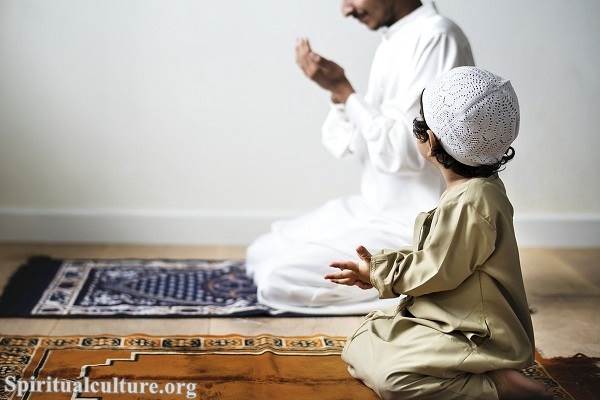In the sacred rhythm of Islamic life, there is a whisper at the beginning of every act of worship — a silent declaration, unseen and unheard, yet powerful enough to shape the meaning of every prayer, fast, and deed. This whisper is niyyah — the intention. In Islam, niyyah is not merely a formality; it is the soul of worship, the inner compass that directs the believer’s heart toward God.
What transforms a simple action into an act of devotion? What gives a prayer its sincerity, or a fast its spiritual fragrance? It is niyyah that answers these questions. In this article, Spiritual Culture invites you into a deep contemplation of intention in Islam — not as a technical requirement, but as a gateway into conscious, transformative faith.
We will explore the role of niyyah in Islamic rituals, its presence in the Qur’an and Hadith, and how it can reframe everyday actions into worship. In a world of distraction and performance, niyyah invites us back to the center — to sincerity, awareness, and divine connection.
Understanding Niyyah: More Than Just a Thought
What Is Niyyah?
At its core, niyyah means “intention” — the internal resolve of the heart to perform an act for a particular purpose. In Islamic worship (ʿibādah), niyyah refers specifically to the intention to carry out an act sincerely for the sake of Allah.
It is not necessarily spoken aloud (except in some schools of thought), but rather held firmly in the heart. The Prophet Muhammad ﷺ said:
“Actions are judged by intentions, and every person will have only what they intended…”
— Sahih al-Bukhari, Hadith 1
This foundational hadith, placed at the beginning of many major Islamic collections, highlights the central role of intention in all spiritual acts.
The Heart’s Compass
Niyyah is the invisible axis around which all worship revolves. A physical prayer without intention is like a body without a soul. It may move, bow, and prostrate — but it lacks direction, meaning, and essence. Intention is the compass that ensures we are not merely going through motions, but orienting our hearts toward God.
Niyyah in Ritual Worship (ʿIbādāt)
Salah (Prayer)
To perform salah, one must intend the specific prayer, its time, and that it is for the sake of Allah. The validity of salah begins with this conscious decision.
In the Shafi’i and Maliki schools, niyyah must be formed at the beginning of the prayer, with clear awareness of what one is doing. In the Hanafi school, while niyyah in the heart suffices, it must precede the takbir (the initial “Allahu Akbar”).
The deeper meaning? That even a perfect outward form of prayer cannot substitute for the inward spark of sincerity.
Sawm (Fasting)
Ramadan fasting is incomplete without the niyyah to fast. The Prophet ﷺ emphasized:
“Whoever does not make intention to fast before dawn, there is no fast for him.”
— Abu Dawood
For obligatory fasts, niyyah must be formed each night before Fajr. For voluntary fasts, it may be made even after sunrise if no food or drink was consumed. The beauty here is subtle: fasting is not only abstaining from food but anchoring oneself in purpose.
Hajj and Umrah
The pilgrimage begins not with the first step, but with the niyyah expressed through the talbiyah:
“Labbayka Allahumma labbayk” — “Here I am, O Allah, here I am.”
Here, the intention is not only for the rite, but for surrender — for stepping out of the self and into sacred movement toward God.
Zakat and Charity
Even in giving, niyyah matters. A donation given for status or recognition is not counted as an act of worship. But even a small coin given with sincere intention can outweigh mountains.
The Qur’an reminds:
“They give food, in spite of love for it, to the needy, the orphan, and the captive, [saying], ‘We feed you for the sake of Allah alone. We desire neither reward nor thanks from you.’”
— Surah Al-Insan (76:8–9)
The Spiritual Power of Niyyah Beyond Ritual
Elevating the Everyday
One of the remarkable aspects of niyyah is its ability to transform the mundane into the sacred. A believer who eats with the intention of gaining strength to worship Allah turns a meal into devotion. A mother nurturing her child out of love for Allah finds her caregiving filled with reward.
“Indeed, every action of the son of Adam is multiplied… except fasting, for it is for Me, and I shall reward it.”
— Sahih al-Bukhari
The principle of niyyah means that everything — walking, working, speaking — can become worship if the heart is rightly directed.
Sincerity (Ikhlas) and Intention
Closely tied to niyyah is the concept of ikhlas — purity of intention. The Qur’an repeatedly calls to worship Allah “with sincere devotion” (mukhlisina lahu ad-deen). Without ikhlas, niyyah can be corrupted by ego, desire for praise, or worldly benefit.
The Prophet ﷺ warned:
“The first people to be judged on the Day of Judgment will include a martyr, a scholar, and a generous man — all of whom did good deeds, but not for Allah. And they will be cast away.”
— Sahih Muslim
This hadith is a sobering reminder that actions done without sincere niyyah can lead to spiritual ruin — even if they appear outwardly noble.
Niyyah in the Qur’an: Verses of Intention
Though the word niyyah is not explicitly used in the Qur’an, its spirit pervades its verses.
“Say, ‘Indeed, my prayer, my sacrifice, my living and my dying are for Allah, Lord of the Worlds.’”
— Surah Al-An’am (6:162)
This verse captures the totality of niyyah — a life oriented toward the Divine in all its dimensions.
“And they were not commanded except to worship Allah, [being] sincere to Him in religion…”
— Surah Al-Bayyina (98:5)
Here, the essence of religion is distilled to pure intention. Sincerity is not an accessory; it is the root.
Intention and the Modern Believer
Fighting Distraction with Purpose
In today’s world, where performance often replaces presence, the concept of niyyah is a radical spiritual antidote. It reminds the believer to return to purpose, to begin each act with awareness, to move from autopilot to mindfulness.
Whether it is starting your day, entering work, or scrolling your phone — niyyah can reframe your path. Ask: “Why am I doing this?” and let the answer bring you back to God.
Between Performance and Presence
There is a difference between performing an act of worship and being present in it. Niyyah invites us not to simply “do” worship but to be in worship — fully, intentionally, sincerely.
Even when the heart is distracted, the renewal of niyyah is a return. In that way, every moment is a chance to begin again.
Practical Ways to Cultivate Niyyah
1. Begin with Awareness
Pause before every prayer, fast, or good deed. Reflect: “Why am I doing this?” Say quietly in your heart, “For You, O Allah.”
2. Renew Intention Often
Niyyah can fade over time. Revive it regularly — especially in long tasks, difficult relationships, or daily routines.
3. Align Actions with Values
Before making decisions, ask if your intention is in harmony with the principles of Islam — compassion, justice, humility, sincerity.
4. Practice Hidden Acts of Worship
Engage in deeds only Allah sees — night prayers, secret charity, quiet forgiveness. These purify niyyah from showing off.
5. Write Your Intentions
Some believers journal their intentions before Ramadan, before giving charity, or even before beginning a project. This builds clarity and accountability with the self.
Reflect and Reimagine
At the heart of Islam is the quiet power of niyyah — the intention that turns action into devotion, the thought that turns routine into remembrance, the heartbeat of a sincere soul seeking its Creator.
If every breath can carry niyyah, then every moment can become worship.
Dear reader, let us pause more often. Let us begin more consciously. Let us remember that in the eyes of God, it is not only what we do — but why we do it — that matters most.
So as you rise for prayer, break your fast, give in charity, or walk into the world today — let your heart whisper:
“For You, O Allah.”
If you found meaning in this article, we invite you to explore more reflections on the spiritual roots of Islamic practice at SpiritualCulture.org — where heart, culture, and faith come together.



